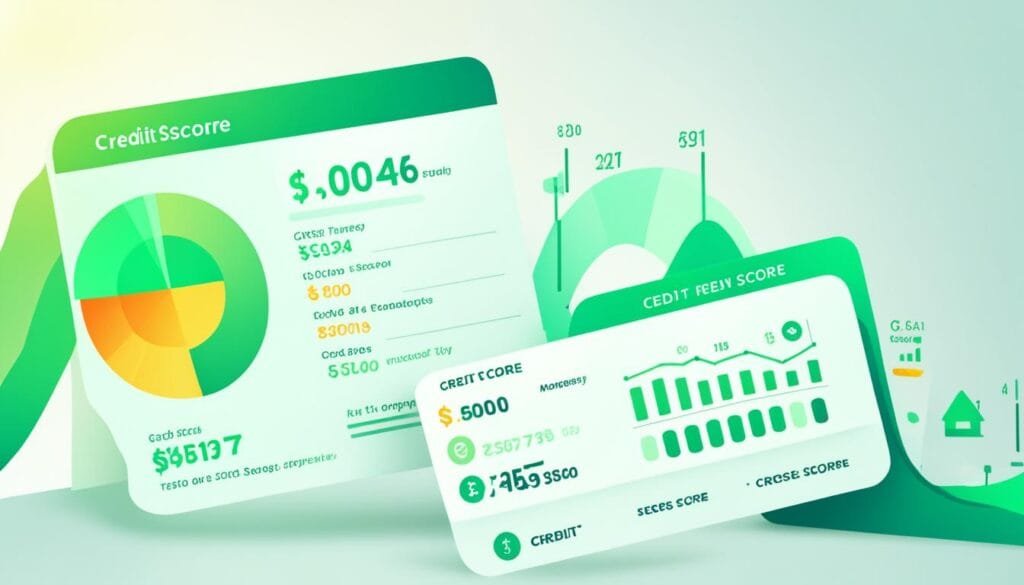Credit cards can be a valuable tool for managing your finances and building a healthy credit score. With the right knowledge and practices, you can make the most of your credit cards while avoiding common pitfalls. In this article, we’ll explore smart credit card tips to help you use your cards wisely and safeguard your financial health.
Key Takeaways:
- Pay off your credit card balance in full each month to prevent debt accumulation.
- Manage your credit card payments and utilization to maintain a healthy credit score.
- Understand the terms of your credit card agreements to avoid unnecessary fees.
- Choose the right credit card that aligns with your financial goals and spending habits.
- Maximize credit card rewards by using them strategically without overspending.
Paying Off Your Balance in Full Each Month
The best way to avoid credit card debt is to pay your balance in full each month. By doing so, you can prevent accumulating debt and ensure that you’re using your credit card as a tool to build credit rather than to make purchases beyond your means. Making timely and full payments is crucial in maintaining a healthy credit card usage.
When using a credit card, it’s essential to only make purchases that you can afford to pay off within your billing cycle. This means carefully budgeting and ensuring that you have enough funds to cover your expenses before relying on credit. By paying off your balance in full, you avoid costly interest charges and the risk of falling into a cycle of debt.
One strategy to help you manage your credit card payments is to set up automatic payments. By doing so, you can ensure that you never miss a payment deadline and avoid late fees. Another approach is to make multiple payments throughout the month, especially if you have a high credit utilization ratio. By spreading out your payments, you can keep your balance low and improve your credit score.
Benefits of Paying Off Your Balance in Full Each Month
- Prevents credit card debt
- Avoids interest charges
- Builds a positive credit history
- Maintains a good credit utilization ratio
- Provides peace of mind and financial stability
Remember, paying off your balance in full each month is not only a responsible financial practice but also a way to unlock the full benefits of a credit card. It allows you to stay in control of your finances, build a strong credit profile, and enjoy the convenience of using credit cards without the burden of debt.
“Paying off your credit card balance in full each month is the most effective way to prevent debt and maintain a healthy credit card usage.” – [Financial Expert Name]
By adopting the habit of paying off your balance in full, you are taking a proactive step towards financial well-being and setting yourself up for long-term success.
Managing Credit Card Payments and Utilization
In addition to paying off your balance in full, it’s important to stay on top of your credit card payments to maintain a healthy financial profile. Late payments can result in expensive fees and negative impacts on your credit history.
One effective way to ensure timely payments is by setting up automatic payments. By authorizing your credit card provider to deduct the payment amount from your bank account on the due date, you can avoid any chances of missing payments. This simple step helps you stay organized and eliminates the risk of incurring late fees.
If automatic payments aren’t an option, consider making multiple payments throughout the month. Breaking down your credit card bill into smaller, more manageable payments can make it easier to keep up with and reduce the chances of missing a due date.
Benefits of Managing Credit Card Payments
Timely credit card payments have several benefits:
- Avoidance of late fees and penalties
- Maintaining a positive credit history
- Protection of your credit score
- Ability to qualify for lower interest rates and better credit card offers in the future
It’s also crucial to keep your credit card utilization ratio low. Your utilization ratio is the percentage of credit you’re currently using, calculated by dividing your outstanding credit card balances by your total credit limit. A low utilization ratio, ideally below 30%, demonstrates responsible credit usage and can help maintain a good credit score.
To keep your utilization ratio low, consider paying off your credit card balances more frequently or increasing your credit limit. However, it’s essential to exercise caution and not use these strategies as a tool for overspending or accumulating unnecessary debt.
By managing your credit card payments and utilization effectively, you can maintain a strong financial standing and ensure a positive credit history.
Comparison of Credit Card Utilization Ratios
| Credit Card | Credit Limit | Balance Owed | Utilization Ratio |
|---|---|---|---|
| Card A | $5,000 | $1,500 | 30% |
| Card B | $10,000 | $2,500 | 25% |
| Card C | $7,500 | $3,000 | 40% |
As shown in the table above, maintaining a lower utilization ratio can help you achieve a healthier financial profile. Card B, with a utilization ratio of 25%, demonstrates responsible credit utilization compared to Card C, where the utilization ratio is high at 40%.
Remember, managing credit card payments and keeping your utilization ratio low are key factors in maintaining good credit health and financial stability.
Understanding Credit Card Agreements and Choosing Wisely
When it comes to using credit cards, understanding the terms and conditions of your credit card agreements is crucial. Different credit cards come with varying interest rates and potential fees, and by familiarizing yourself with these terms, you can avoid unexpected charges and manage your payments effectively.
Interest rates play a significant role in your credit card usage. They determine the cost of borrowing money from the credit card issuer if you carry a balance. It’s important to compare interest rates to find a credit card that offers favorable terms. By choosing a credit card with a low interest rate, you can save money on interest charges and pay off your balance more quickly.
Potential fees are another essential aspect to consider when reviewing credit card agreements. Common fees may include annual fees, late payment fees, over-limit fees, balance transfer fees, and foreign transaction fees. These fees vary from card to card, and understanding them beforehand can help you avoid unexpected expenses. Be sure to read the fine print and ask questions if anything is unclear.
Choosing the right credit card is a decision that should align with your spending habits and financial goals. With so many options available, it’s important to take the time to research and compare credit cards. Consider factors such as rewards programs, cashback offers, travel benefits, and any other perks that may benefit you. Additionally, think about whether you typically carry a balance or pay in full each month, as this may influence which credit card is the best fit for you.
It’s worth noting that opening too many credit cards at once can negatively affect your credit score. Each time you apply for a new credit card, it triggers a hard inquiry on your credit report, which can temporarily lower your score. Therefore, it’s important to choose wisely and only apply for credit cards that you genuinely need.

By understanding credit card agreements and choosing the right credit card, you can make informed decisions that align with your financial goals. Take the time to read the fine print, compare interest rates and fees, and consider your spending habits. This way, you can optimize your credit card usage and take full advantage of the benefits that come with responsible credit card ownership.
Maximizing Credit Card Rewards
When it comes to credit cards, rewards can be a game-changer. By understanding how to maximize credit card rewards, you can make the most out of your everyday spending. Whether it’s cash back, miles, or points, rewards cards offer enticing incentives that can benefit savvy cardholders.
One of the key strategies for maximizing credit card rewards is finding the right rewards card that aligns with your spending habits. Different credit cards offer different types of rewards, so it’s important to choose one that suits your lifestyle. For example, if you frequently travel, a rewards card that offers airline miles might be the best fit for you. Alternatively, if you prefer cash back rewards, there are plenty of options available for that as well.
Using your rewards card strategically is another way to maximize your benefits. By understanding the earning and redemption structure of your rewards program, you can make smart decisions about where and how to use your card. Some cards offer higher rewards for specific categories such as dining, groceries, or gas. By using the right card for each category, you can earn more rewards on your everyday expenses.
Consider diversifying your rewards by using multiple cards for different categories of spending. This can help you earn more rewards across various areas of your life. For example, you might use one card for dining and entertainment expenses, another card for travel, and a third card for everyday purchases. Just make sure to keep track of your spending and pay off your balances on time to avoid accruing interest and debt.
It’s important to note that while credit card rewards can be tempting, it’s crucial to use them responsibly. Don’t fall into the trap of overspending or taking on unnecessary debt just to earn rewards. Use your credit card for purchases you would make anyway and always prioritize your financial well-being.

Strategies for Maximizing Credit Card Rewards
- Choose the right rewards card that aligns with your spending habits.
- Understand the earning and redemption structure of your rewards program.
- Use the appropriate card for each spending category to earn more rewards.
- Diversify your rewards by using multiple cards for different types of expenses.
- Always use your rewards responsibly and avoid overspending or taking on debt.
By applying these strategies, you can make the most out of your credit card rewards and enjoy additional benefits for your everyday purchases.
| Rewards Card | Key Benefits |
|---|---|
| Cash Back Card | Earn a percentage of your purchases back as cash. |
| Travel Rewards Card | Accumulate miles or points to use towards flights, hotels, and more. |
| Gas Rewards Card | Get cash back or discounts on gas purchases. |
| Dining Rewards Card | Receive extra rewards or discounts at participating restaurants. |
“Maximizing your credit card rewards requires choosing the right card, using it strategically, and practicing responsible financial habits.” – Financial Expert
What Are Some Tips for Using Credit Cards Responsibly for Financial Health?
When it comes to maintaining good financial health, following responsible credit usage tips is essential. Always make timely payments, keep your credit utilization low, and avoid unnecessary purchases. Monitor your spending and regularly review your credit report to ensure accuracy and detect any potential issues early on.
Conclusion
By incorporating smart credit card usage into your financial routine, you can achieve and maintain a healthy financial status while taking advantage of the benefits that credit cards offer. Responsible credit card management is key to ensuring that you build credit, earn rewards, and avoid unnecessary debt.
Paying off your credit card balance in full each month is a fundamental practice that prevents the accumulation of debt and allows you to use your credit card as a tool for building credit rather than incurring expenses beyond your means. Additionally, managing your credit card payments and utilization ratio is crucial in maintaining a good credit score and avoiding late fees.
Understanding the terms and conditions of your credit card agreements empowers you to utilize your credit card wisely and avoid unexpected fees. Choosing the right credit card that aligns with your spending habits and financial goals is also a crucial aspect of responsible credit card management.
Maximizing credit card rewards can provide you with additional benefits. Finding the right rewards card that suits your spending habits allows you to optimize your rewards, such as cash back, miles, or points. However, it is imperative to use these rewards responsibly and refrain from overspending or accumulating debt in pursuit of rewards.
By following these smart credit card tips, you can use credit cards to your advantage, prioritize your financial health, and achieve your financial goals. Remember, responsible credit card management ultimately contributes to building a strong credit history, maximizing credit card benefits, and ensuring a sound financial future.
FAQ
How can I avoid credit card debt?
The best way to avoid credit card debt is to pay your balance in full each month. This means only making purchases that you can afford to pay off within your billing cycle. By doing so, you can prevent accumulating debt and ensure that you’re using your credit card as a tool to build credit rather than to make purchases beyond your means.
What are some tips for managing credit card payments and utilization?
In addition to paying off your balance in full, it’s important to pay your credit card bill on time to avoid late fees and negative impacts on your credit history. Setting up automatic payments or making multiple payments each month can help you stay on track. It’s also important to keep your credit card utilization ratio low, ideally below 30% of your available credit. Your utilization ratio is the percentage of credit you’re currently using. By keeping it low, you can prevent debt accumulation and maintain a good credit score.
How can I understand credit card agreements and choose the right credit card?
It’s essential to read and understand the terms of your credit card agreements. Different credit cards come with varying interest rates and potential fees. By familiarizing yourself with the terms, you can avoid unexpected fees and manage your payments effectively. Additionally, choosing the right credit card that aligns with your spending habits and financial goals is crucial. Opening too many credit cards at once can be overwhelming and negatively impact your credit score. Take the time to choose wisely and pick a credit card that suits your needs.
How can I maximize credit card rewards?
Credit card rewards can provide additional benefits for savvy cardholders. Finding the right rewards card that aligns with your spending habits can help you maximize your rewards. Whether it’s cash back, airline miles, or other incentives, using your rewards card strategically can help you earn more for your everyday spending. Consider diversifying your rewards by using multiple cards for different categories of spending. However, it’s important to use these rewards responsibly and avoid overspending or taking on debt to earn rewards.
How does smart credit card usage contribute to financial health?
By following smart credit card tips such as paying off your balance in full, managing your credit card payments and utilization, understanding credit card agreements, choosing the right credit card, and maximizing your rewards, you can use credit cards as a tool for savvy financial health. By using credit cards wisely, you can build credit, earn rewards, and avoid unnecessary debt. Always prioritize your financial health and use credit cards as a tool to support your financial goals.

